London is the link that unites all of us who were rocked in the soft cradle of the English language or first slept on its comfortable cushions at a later age. Our shared language is the tie that binds everyone reading this, and the capital is our tongue’s birthplace. At its heart is the British Library, which automatically receives a copy of everything published in the United Kingdom and Ireland. Home to some of the greatest treasures of the written word, the British Library in London functions very much as the nation’s – and the world’s – collective memory.
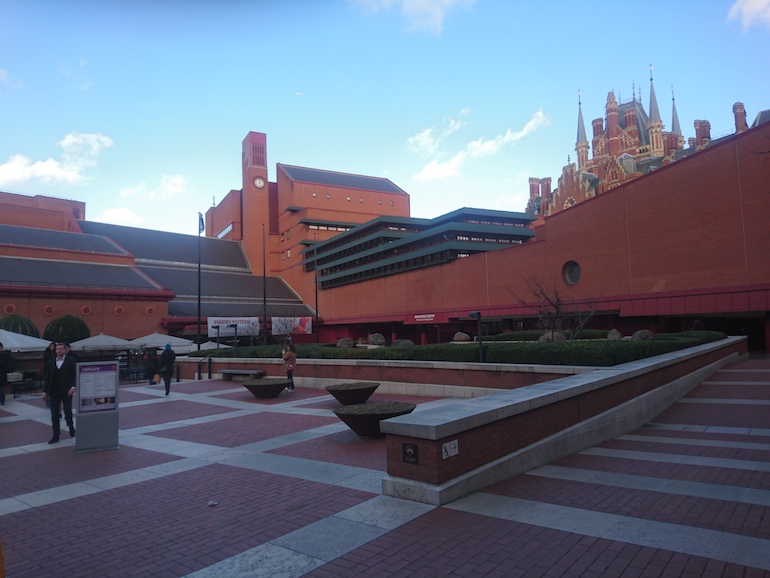 British Library in London: Exterior View. Photo Credit: © Steve Fallon.
British Library in London: Exterior View. Photo Credit: © Steve Fallon.
John Ritblat Gallery at the British Library
This dimly lit gallery is a highlight of any visit as it contains the British Library’s most precious and high-profile documents. A Blue Badge Tourist Guide will introduce you to some of the 250 items on display here that span three millennia: everything from two of the four existing copies of the Magna Carta and the only surviving copy of the epic Beowulf to Shakespeare’s First Folio and manuscripts by some of Britain’s best-known authors, such as including Lewis Carroll, Jane Austen, Thomas Hardy and Charlotte Brontë. You’ll even see some of the Beatles earliest lyrics, such as those to I Want to Hold Your Hand and A Hard Day’s Night, handwritten on the back of airline envelopes.
The John Ritblat Gallery at the British Library is also the repository of rare texts from most of the world’s major religions: the Codex Sinaiticus, the first complete text of the New Testament; a Gutenberg Bible (1455), the first Western book printed using movable type; the Buddhist Diamond Sutra, the world’s earliest printed book; and spectacularly illustrated Jain, Muslim and Judaic sacred texts such as the Golden Haggadah. Pick up one of the handsets on the wall to hear selections from the Sound Archive, including the first-ever recording, made by Thomas Edison in 1877.
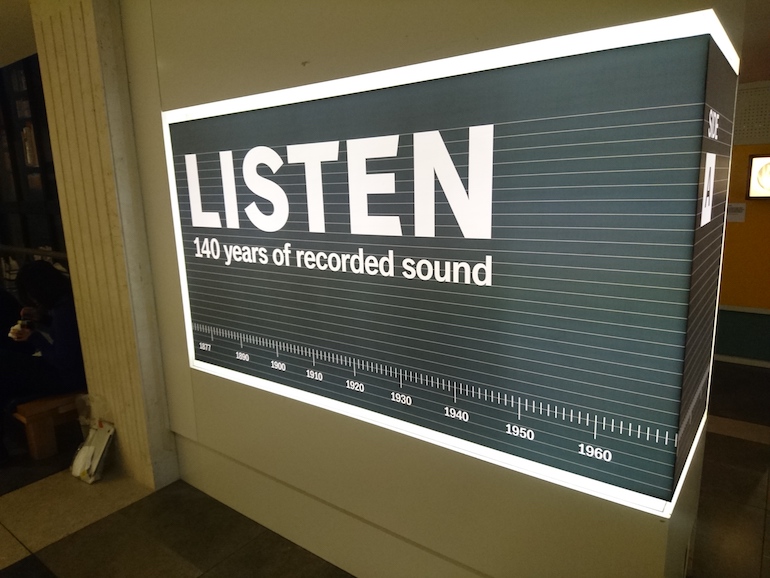 British Library: 140 Years of Recorded Sound. Photo Credit: © Steve Fallon.
British Library: 140 Years of Recorded Sound. Photo Credit: © Steve Fallon.
King’s Library Tower at the British Library
In the middle of the British Library is this six-storey, glass-walled tower containing the wonderful King’s Library, the 85,000-volume collection of King George III given to the nation by his son, George IV, in 1823. It is one of the `foundation collections’, items donated by or acquired from various luminaries such as the collector and architect Sir Hans Slone, which formed the basis of the library and the British Museum.
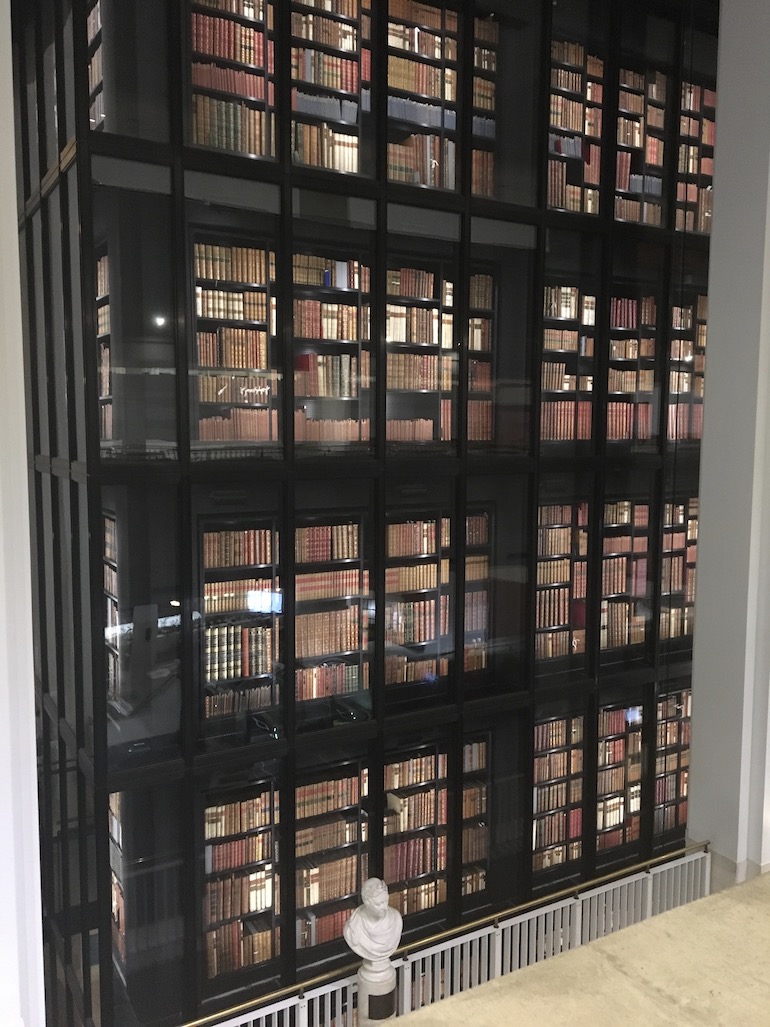 British Library in London: King’s Library Tower. Photo Credit: © Ursula Petula Barzey.
British Library in London: King’s Library Tower. Photo Credit: © Ursula Petula Barzey.
The Back Story of the British Library
Until 1973 the British Library was part of the British Museum and stayed in the museum’s circular Reading Room until moving to its new purpose-built home on the north side of Euston Road in St Pancras 25 years later. Consisting of low-slung red-brick terraces, which consumed 10 million bricks and 180,000 tonnes of concrete, and fronted by a large piazza, Colin St John Wilson’s building was from the start a love-it-or-hate-it affair.
Indeed, when the British Library opened in 1998 after 15 years of construction, Prince Charles likened it to a `secret-police headquarters; in contrast, its counterpart across the Channel in Paris, the Bibliothèque Nationale de France François Mitterrand was hailed as a `wonder of the modern world.’ Yet, while the reading rooms of the British Library were on the upper floors and the stacks in the basements, the reverse was true in Paris where many of the more than 10 million books and historical documents were shelved in sun-drenched, 18-storey towers while readers and researchers sat in artificially lit basement halls.
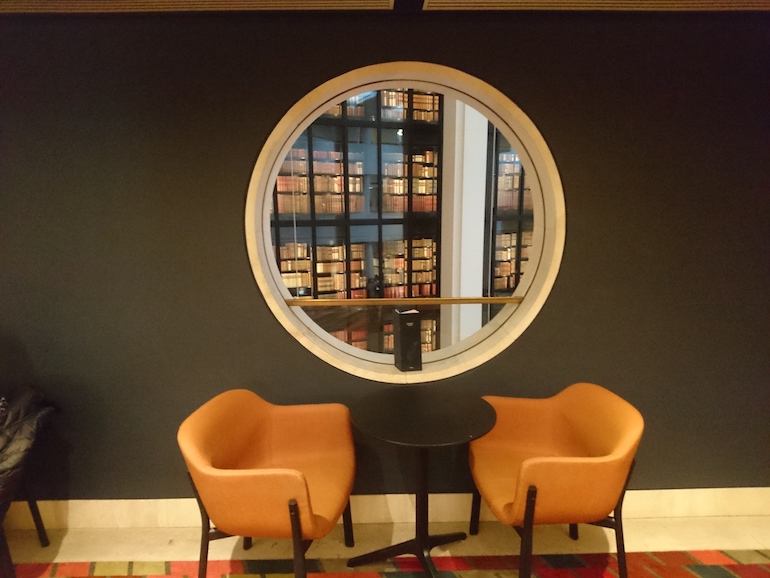 British Library in London: View of King’s Library Tower. Photo Credit: © Steve Fallon.
British Library in London: View of King’s Library Tower. Photo Credit: © Steve Fallon.
A Superlative Building
The British Library is not just a treasury of manuscripts – it is also a wealth of superlatives and fun facts:
- The library is the largest public building constructed in the UK in the 20th century.
- It is also the deepest (25m) building in the country, with 14 floors – nine above and five below. But because the basement floors are double in height, it is equivalent to a 17-storey building.
- The library now counts some 170 million items – of which 14 million are books and 4 million maps – increased by 3 million items annually.
- They sit on 625km of shelves, with almost 10km more added each year.
- The Digital Library System crawls and stores every UK website annually.
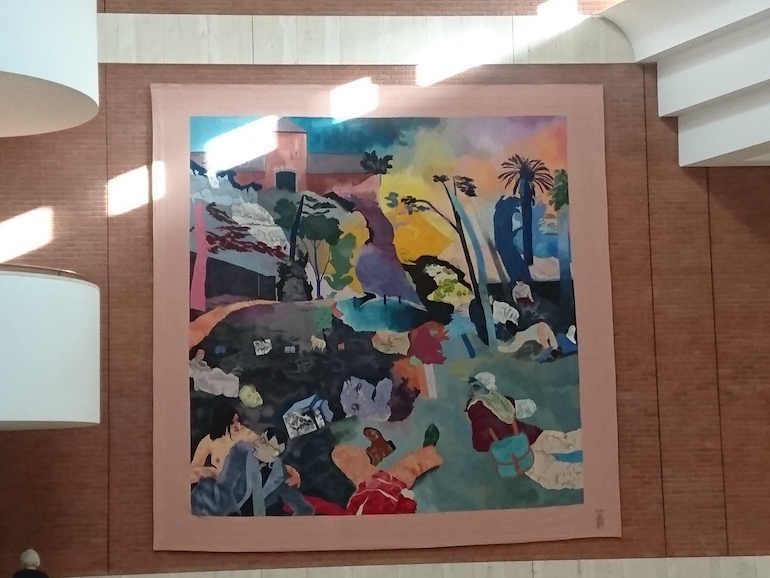 British Library in London: If Not, Not Tapestry by RB Kitaj hung in St Pancras Entrance Hall. Photo Credit: © Steve Fallon.
British Library in London: If Not, Not Tapestry by RB Kitaj hung in St Pancras Entrance Hall. Photo Credit: © Steve Fallon.
For Art’s Sake
Away from literary treasures, important artwork is strewn throughout, both inside and out the British Library. In the piazza, there’s Eduardo Paolozzi’s oversized statue of Sir Isaac Newton, based on a drawing by William Blake, and a sculpture called Planets by Antony Gormley. Inside are portraits by Godfrey Kneller and David Hockney, a delightful tapestry titled If Not, Not by RB Kitaj, and everyone’s favourite, a bronze sculpture by Bill Woodrow of a chained and open book that forms a (very much useable) bench called Sitting on History. Apparently, the sculpture `refers to the book with ball and chain as the captor of information from which we cannot escape.’ Flights of fancy excepted, we suppose.
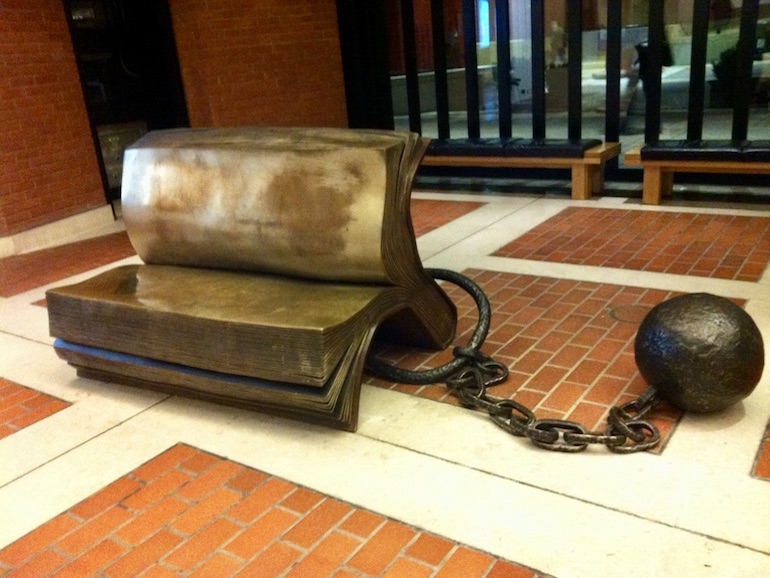 British Library in London: Sitting on History (1995) sculpture by Bill Woodrow. Photo Credit: © Ursula Petula Barzey.
British Library in London: Sitting on History (1995) sculpture by Bill Woodrow. Photo Credit: © Ursula Petula Barzey.
Special Exhibitions at the British Library
In addition to its permanent collection, the British Library hosts some cutting-edge special exhibits, which usually charge a fee. Closing in late February 2018 is the phenomenally successful blockbuster Harry Potter: A History of Magic, marking the 20th anniversary of the first publication of the immensely popular series of books.
In 2018 look forward to James Cook: The Voyages, a major exhibition marking 250 years since Captain Cook set sail on three voyages that changed the world; Anglo-Saxon Kingdoms, a spectacular exhibition exploring the riches of Anglo-Saxon art and ideas over six centuries; and a display in the Ritblat Gallery of the recently acquired archive of the comedian and travel writer Michael Palin.
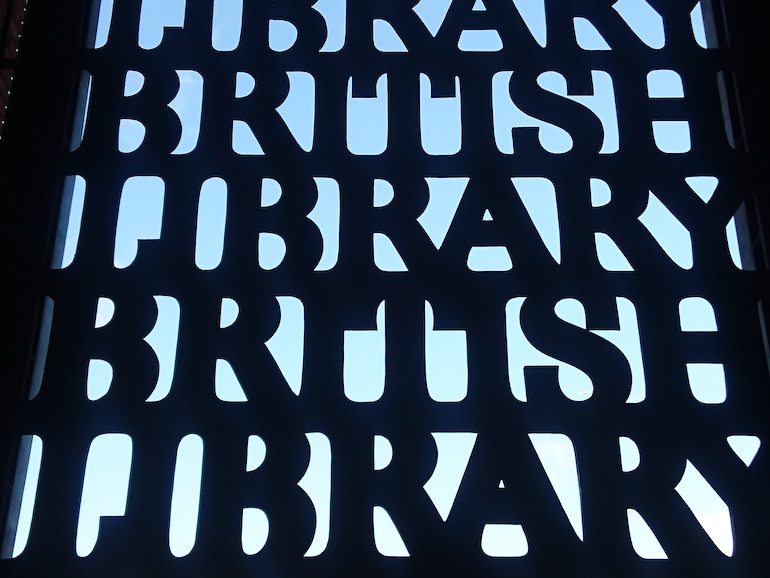 British Library in London: Entry Gate. Photo Credit: © Steve Fallon.
British Library in London: Entry Gate. Photo Credit: © Steve Fallon.
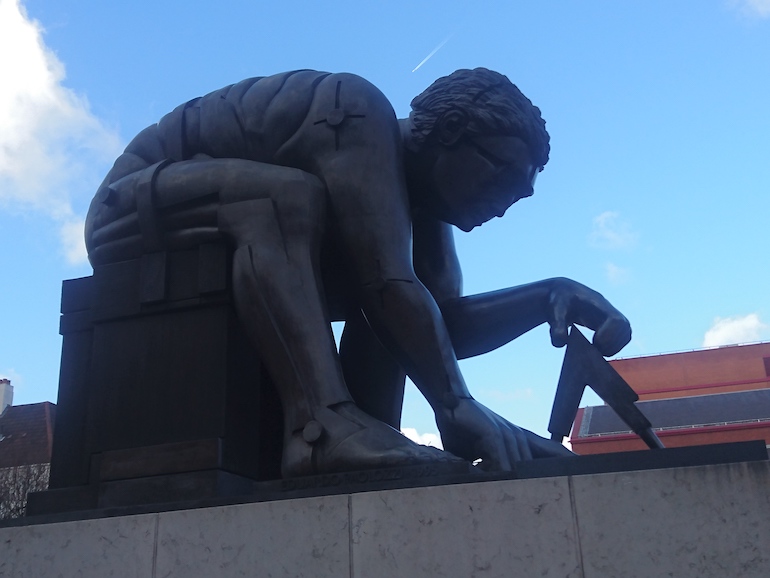 British Library in London_Newton after Blake Bronze Statue by sculptor Eduardo Paolozzi. Photo Credit: © Steve Fallon.
British Library in London_Newton after Blake Bronze Statue by sculptor Eduardo Paolozzi. Photo Credit: © Steve Fallon.



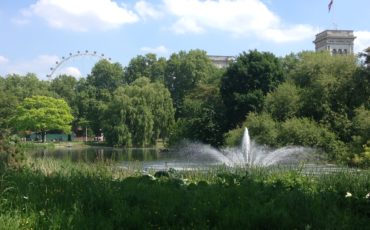
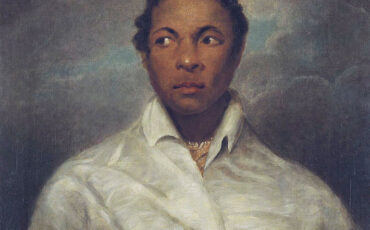

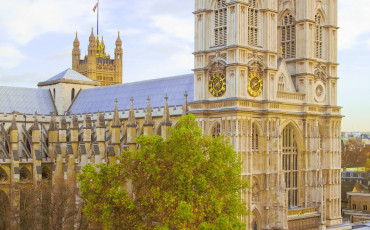
Leave a Reply